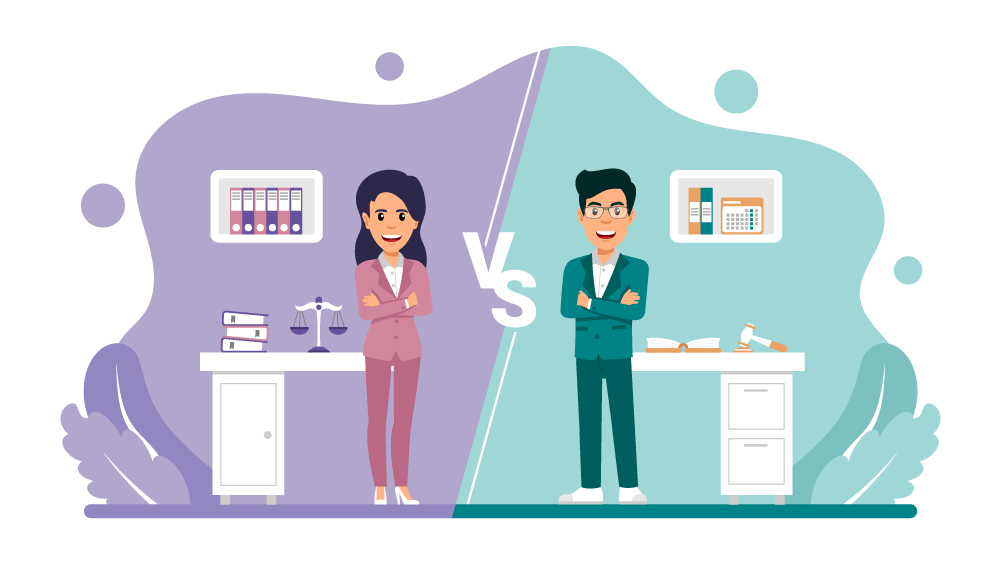Both paralegals and lawyers work in the legal profession. However, they are certainly not the same. If you’re considering a career in law, either might make sense, however.
Before you make your final decision, it’s best to compare the two careers. Let’s look at what a paralegal is, what a lawyer is, and how they are different.

What is a Paralegal?
The American Bar Association defines a paralegal as “a person, qualified by education, training or work experience who is employed or retained by a lawyer, law office, corporation, governmental agency or other entity and who performs specifically delegated substantive legal work for which a lawyer is responsible.”
This person will help by researching case law and can also work on legal contracts. They offer help to organize files and prepare documents, as well. Paralegals tend to work for law firms, but may also work for insurance firms or government agencies.
What is a Lawyer?
The American Bar Association defines a lawyer as “a licensed professional who advises and represents others in legal matters.”
A lawyer must uphold the law and protect the rights of their clients. With a proficient understanding of the law, this type of professional will perform their duties.
Paralegal vs Lawyer: The Key Differences
While both a paralegal and a lawyer will likely work for a law firm, they are two different jobs. Let’s look at a few of the key differences.
Job Duties
While there is some overlap in the job duties a paralegal and a lawyer will perform, they often take on different roles. Paralegals will do quite a bit of the legwork, while the lawyer will meet with clients and present the case.
A paralegal will likely do investigation, write reports, file paperwork, schedule deposition times, and more. They work as an assistant to the lawyer, in most cases.
Lawyers have the ability to go to court and present their cases to the judge and jury. Paralegals will not be able to perform this task. Often, lawyers will be the ones meeting with clients, especially high-profile clients.
Both paralegals and lawyers tend to work long hours. They will have tight deadlines and both can be rather stressful careers. However, a lawyer will be front and center, while a paralegal will be in the background.
Education
One of the biggest differences between a paralegal and a lawyer is the necessary education. Becoming a lawyer is a much larger commitment. you will need to spend around seven years in school, including a four-year bachelor’s degree and three years to complete law school.
If you decide to become a paralegal, you will need to earn an Associate’s degree. This degree can be earned in about two years. Some students may be able to complete the coursework to become a paralegal in 18 months or less. It’s even possible to start on some of the necessary courses while you are still in high school.
A lawyer will earn an undergraduate degree, and then take the Law School Admission Test (LSAT). This test will help determine the law school they will get into. A high score could lead to a better law school. It’s a very competitive environment at most top law schools.
Along with the actual education, paralegals don’t have to go through the LSAT or the bar exam. They won’t have nearly as many stumbling blocks to worry about. It’s not uncommon for lawyers to earn a paralegal degree first and use it to work while finishing their law degree.
Lawyers must pass the bar exam after they complete law school, too. This is a difficult exam and without passing it, you cannot work as a lawyer.
A lawyer will also need to pass the jurisdiction’s character and fitness evaluation. This is a very in-depth questionnaire where you will have to disclose details from your past. This might include substance abuse issues, misconduct, or past criminal convictions.
Technically, you can become a paralegal without a degree, if you have enough work experience and training. However, this will depend on your state. Some states even require paralegals to complete continuing legal education training hours.
Salary
A rather large difference you will find between a paralegal and a lawyer is the salary. According to the Bureau of Labor and Statistics, lawyers made, on average, $126K in 2020. The BLS puts the average earnings for paralegals at about $53K in 2020.
Lawyers make quite a bit more than paralegals and for good reason. They went through more education and have earned a license to practice law.
Job Prospects
There is another difference seen in the job prospects of a paralegal vs a lawyer. While both have a high projected growth rate, lawyers tend to land jobs based on their performance in school. Paralegals don’t have as much pressure on their school performance when landing a job.
A lawyer finishing at the top of his/her class will likely be headhunted for a position. Paralegals will have to go through the common process of applying, interviewing, and securing a job. However, if a lawyer doesn’t do so well in law school or comes from a lower-end school, they may have limited job prospects.
Paralegal vs Lawyer: Which is Right for You?
If you want a faster path to a career, you want to become a paralegal. However, if you want the ability to earn a six-figure salary, becoming a lawyer is the better option.
Those seeking the ability to work for themselves will also need to become lawyers. You can also gain more prestige as a lawyer. However, if you don’t want to spend seven years in school and have to pass two very difficult exams, becoming a paralegal might make more sense.
Both paralegals and lawyers are important careers. They can both come with plenty of rewards, too. Choosing between the two really comes down to what you prefer and how much you want to earn. Take the time to consider both before you choose which career is right for you.





